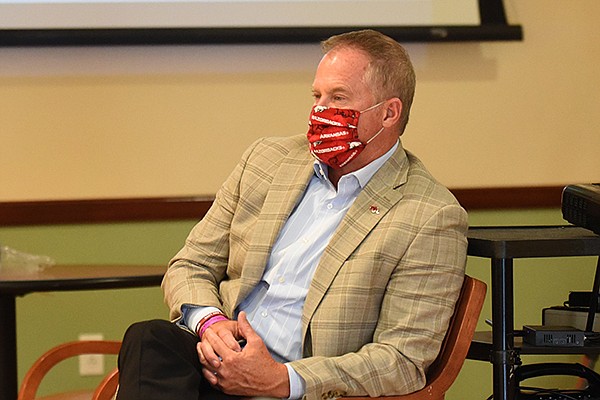FAYETTEVILLE — Incentive bonuses earned by most University of Arkansas coaches in the upcoming academic year will be deferred to the 2021-22 year.
Assuming sports can be played as scheduled, it’s a move that should save the UA athletics department hundreds of thousands of dollars in the 2021 fiscal year. UA coaches received incentive bonuses totaling around $700,000 in fiscal 2020 and $1 million in fiscal 2019.
Kevin Trainor, a spokesman for the UA athletics department, said in an email the UA has made a "definitive commitment" to its coaches to pay the bonuses next fiscal year. Trainor said the change applies to all coaches who are under contract with the department, including all 15 head coaches. Some assistant coaches work on year-to-year employment agreements.
Trainor said the bonus deferral is not expected to expand to subsequent years.
The UA budgets around $2 million each year for coaching bonuses but typically doesn’t come near paying that amount during years when the football program performs poorly, as it has the past three seasons. To illustrate football’s impact on the bonus budget, the Razorbacks’ football staff earned close to $400,000 in bonuses just for playing in the Belk Bowl in 2016.
The bulk of bonus payments are paid to head coaches who win division or conference championships, or lead their team to NCAA postseason play. Head coaches also receive smaller bonuses for academic success and assistant coaches can receive bonuses for on-field success.
As part of the $700,000 paid during fiscal 2020, Arkansas’ soccer, women’s cross country, women’s indoor track and men’s indoor track coaching staffs received bonuses for winning SEC championships, and the women’s basketball staff was in line to receive a bonus for qualifying for the NCAA Tournament, although participants were never announced. The women’s cross country coaches also earned bonuses for winning the NCAA championship last fall.
Fourteen winter and spring sports had their season end early, eliminating the possibility for more bonuses.
Through cost-cutting measures like the bonus deferrals and the money saved from the NCAA’s ban on off-campus recruiting, the UA athletics department has avoided salary cuts, layoffs and furloughs that have been prevalent throughout the college sports industry since the covid-19 pandemic halted play in the spring. The UA has also resisted eliminating any sports, with athletics director Hunter Yurachek stating the economic condition “would have to get extremely bad” to consider such a move.
But Yurachek noted that if the Razorbacks are not able to play a football season, more must be trimmed from the department’s $124.5 million annual budget.
Arkansas' football program, despite a 2-10 record, accounted for nearly $54 million in combined ticket sales, contributions, royalties and licensing last year, not to mention $12.6 million in football media rights and $7.2 million in conference bowl revenue.
“About $41 million of our budget is made up of coaches, administrators and support staff salaries,” Yurachek said last week. “I think there will be a time, if we don’t have football, that we’ll have to start looking at cutting into that pie.”
Arkansas football coach Sam Pittman said last month he was willing to take a pay cut if it helped the department.
“The bottom line is we will do whatever we need to do to have success at Arkansas and to keep all programs alive,” Pittman said. “And if we need to take a pay cut, we’ll take a pay cut.”

